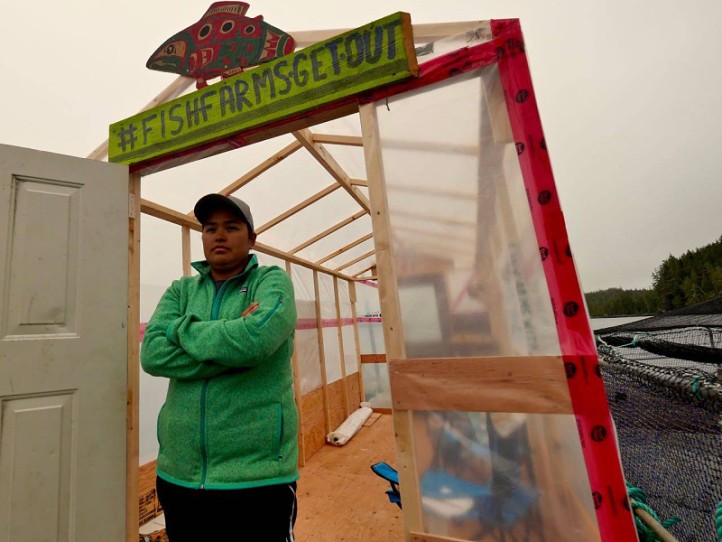The BC Supreme Court has given protestors who have occupied a Marine Harvest fish farm for 81 days until Friday to take down their structures.
Justice Peter Voith also gave First Nation activists one month to respond to the company’s application for an injunction against their occupation of fish farms located on First Nation territory.
If protestors don’t take down their tents and other structures on the fish farms, Marine Harvest can reset its application for an injunction within 36 hours, Voith ruled Tuesday.
Molina Dawson, a 21-year-old Musgamakw protestor from Kingcome Inlet, described the court ruling as both a victory and a defeat.
“It was a combination,” she said. “Marine Harvest wasn’t allowed to argue we are trespassing on our own territory, and we have time to work on a legal strategy. But we have to leave Midsummer… we didn’t want Midsummer to be restocked.”
In late summer members of the Musgamagw, Namgis and Mamalililukulla nations occupied two salmon farms — Swanson and Midsummer — in their territories in the Broughton Archipelago in an effort to reassert aboriginal rights and title in the region.
The Musgamakw Dzawada’enuxw people have never given permission to foreign corporations to operate Atlantic salmon farms in their territory and have quietly protested their presence for 30 years.
The occupation has sparked debates in the legislature and led the New Democratic government to re-assert its commitment to uphold the United Nation’s Declaration on the Rights of Indigenous Peoples.
Marine Harvest’s provincial tenure for the farm is up for renewal in June and the government has already alerted the company that the renewal is not a foregone conclusion.
On Nov. 7 Marine Harvest delivered a letter to three First Nation women occupying the remote Midsummer facility: Molina Dawson, Lindsey Mae Willie and Karissa Glendale.
The letter demanded that the occupiers leave by Nov. 9 because “your occupation of the Midsummer facility creates unacceptable risks to yourself, Marine Harvest staff and Marine Harvest property.”
When the protestors refused to leave the company than applied for a court injunction on Nov 11.
After Tuesday’s ruling Vincent Erenst, managing director of Marine Harvest Canada, said in a press release that “First Nation leadership have made it clear to us that their issue is primarily about Indigenous rights and title. This important government-to-government discussion needs to occur so our business and many other businesses in the Province have clarity about this process.”
“We remain very willing to find compromise that may lead to short-term and long-term solutions,” added Erenst.
But First Nation protestors say the company ignored their demands in August to not restock the facility and leave the area. As a result protestors occupied the site with tents and tiny homes made of wood, plastic and tarpaper.
The occupation forced the company to halt restocking. Six of the 10 pens remain empty.
Alex Morton, a biologist and activist who supports the protestors, says Marine Harvest’s application for an injunction raises some major legal issues. “Can you evict First Nation’s from a part of their territory when they are not committing any crime?”
She described the ruling as “a blow to the girls and the hundreds of people who support them.”
“In my view we got outlawyered, but the fight is not over, Marine Harvest,” Morton told The Tyee. The biologist and vocal fish farm critic is listed on the injunction.
In affidavits presented before Voith on Tuesday, employees of Marine Harvest accused the occupiers of tampering with equipment, interfering with operations and showing aggression to Marine Harvest staff.
In addition Marine Harvest staff reported that the occupation forced the company to hire private security and cost the company millions of dollars because it couldn’t restock the farm.
In one affidavit Micheal Dobbs, Marine Harvest’s acting production manager for the Broughton said that he had hoped that “the rain, wind and cold temperatures would cause the occupiers to depart from Midsummer.” Unfortunately the protestors “seem determined to stay indefinitely,” he added.
In an affidavit Erenst said “the blockades and staff harassment has already damaged the company’s operations, and they will cause significant damage if they continue.”
Marine Harvest, a Norwegian corporation, raises one-fifth of the world’s farm-raised salmon at facilities in Norway, Scotland, Canada, Chile, Ireland and the Faroe Islands.
Persistent problems with sea lice, which can kill both young farmed fish as well as wild migrating ones, has forced the Norwegian government to restrict production licences to those regions along Norway’s coast that keep sea lice in check.
Other growing challenges for the industry include fish escapes, genetic pollution with wild fish and a variety of bacterial and viral diseases.
Molina Dawson said she had occupied the farm because of the industry’s impact on her home, community and culture.
“Our wild salmon are sacred to us and if we lose wild salmon we will lose our culture. Fish farms threaten that.” ![]()
Read more: Indigenous, BC Politics, Environment
















Tyee Commenting Guidelines
Comments that violate guidelines risk being deleted, and violations may result in a temporary or permanent user ban. Maintain the spirit of good conversation to stay in the discussion.
*Please note The Tyee is not a forum for spreading misinformation about COVID-19, denying its existence or minimizing its risk to public health.
Do:
Do not: